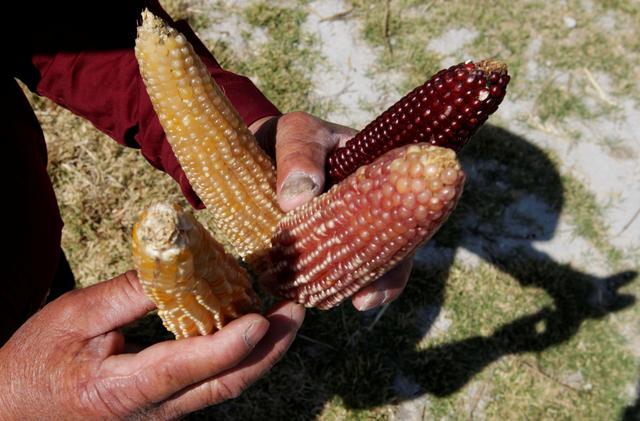Life used to be a whole lot easier for German pharmaceutical and crop science company Bayer. But that was before it bought the scandal-tarnished US GMO giant Monsanto for $66 billion. That has turned out to be a very price indeed. Bayer itself is now worth just $53 billion — $13 billion less than what it paid for Monsanto in 2018. And it has faced tens of thousands of lawsuits claiming that Monsanto’s Roundup weed killer caused non-Hodgkin’s lymphoma.
The German company has agreed to pay as much as $11.5 billion to resolve existing US litigation. It has also proposed to pay a further $2 billion into a fund that would cover people who’ve been using Roundup but haven’t yet developed non-Hodgkin lymphoma, or just haven’t filed a lawsuit yet. But it also continues to reject claims that Roundup causes cancer even as new lawsuits pile up against it. And it wants to assemble its own panel of expert scientists — as opposed to an independent jury — to rule on the viability of those future claims, which is hardly in the interest of those filing the claims.
A Gathering Customer Exodus
As all this is going on, a growing list of countries, states and cities around the world are banning Roundup. They include Mexico, whose government issued a presidential decree on December 31 phasing out the use of the herbicide glyphosate, Roundup’s active ingredient, and banning the cultivation and importation of genetically modified (GM) corn. After pulling a few strings, Bayer was able to win a temporary reprieve from the government’s planned three-year phase out of the herbicide. But that decision has now been overturned by Mexico’s Collegiate Court.
Bayer insists there’s nothing wrong with the herbicide: “Glyphosate is safe and hundreds of scientific studies support that,” the company said in a recent statement, citing its more than four-decade track record in Mexico.
But Mexico’s Ministry of the Environment (Semarnat), formerly a strong advocate of GMOs, is having none of it. The ministry already began restricting imports of glyphosate in 2019, citing the precautionary principle. Glyphosate, it says, has proven to be extremely harmful to both human health and the environment. It has also been classified as “probably carcinogenic to humans” by the World Health Organization (WHO).
To justify its new import ban, Mexico’s government cites the threat of GMO products to human health as well as the risk of contamination of native corn varieties. But there’s another motive at work here: to advance the AMLO administration’s goal of achieving greater food self-sufficiency by promoting domestic corn production. And that puts it on direct collision course with Big Ag and the US government.
Taking On Monsanto, and Winning
The cultivation of GM corn in Mexico, even in field trials, has been prohibited in Mexico since 2013. This was the result of a suit brought by a collective of 53 scientists and 22 civil rights organizations and NGOs. This broad grassroots coalition sought to safeguard Mexico’s diversity and common ownership of corn. It’s a struggle that intensified as GMO oligopolies began pressuring governments across Latin America to introduce legislation that would apply brutally rigid intellectual copyright laws to the crop seeds that farmers are able to grow.
But in Manuel Zeleta, the coalition found a sympathetic — and seemingly incorruptible — judge. In his ruling he banned field trials of GMO corn, citing the potential risks they posed to the environment. If the biotech industry got its way, he argued, more than 7000 years of indigenous maize cultivation in Mexico would be endangered. The country’s 60 varieties of corn would be directly threatened by cross-pollination from transgenic strands.
Monsanto’s response was as swift as it was brutal. Not only did it – and its lackeys in the [Peña Nieto] government – appeal Zaleta’s ruling, it also demanded his removal from the bench for already stating his opinion on a case before sentencing. Targeting the form rather than the substance of Zaleta’s ruling, Monsanto, together with fellow GMO giants such as Syngenta and Dupont, launched at least 90 challenges, all to no avail. And to this day, commercial-scale planting of GMO corn seeds remains illegal in Mexico.
A Sacred Plant
In Mexico corn is far more than just a staple crop. For millenia it has played a vital role in the country’s culture, religions and economy. It was idiolized by the Aztecs and many other pre-Colombian civilizations. But now Mexico, the birthplace of modern corn, is dangerously dependent on international markets for its supplies.
But that is something the AMLO government wants to change. Through his presidential decree Andrés Manuel López Obrador (AMLO for short) doesn’t just want to eliminate the presence of GMOs in the Mexican diet; he also seeks to promote domestic corn production in order to achieve greater food self-sufficiency. He also wants to revitalize rural Mexico, which could help to address one of the root causes of Mexican migration to the US.
Since NAFTA Mexico has become increasingly reliant on foreign producers of corn and other staples like beans and rice. Mexico buys roughly a third of the corn it consumes from the U.S. as well as much of its rice and beans. Much of the corn is used to feed livestock. In 2019, Mexico was the biggest export market for U.S. corn, wheat, dairy products, poultry meat & products, distiller grains, rice, sweeteners, animal fats, and eggs & products. In return Mexico exports to the U.S. tomatoes, chiles, avocado, coffee, grapes, strawberries, water melon and other fruits and vegetables.
But it’s the staple crops that matter the most. They are what everyone eats and they are almost all moving in one direction. In a study on the role of American agribusiness in the Mexican economy the Woodrow Wilson Center found that U.S. exports of eight basic agricultural staples (corn, soy, wheat, cotton, rice, beef, pork and chicken) have seen huge increases — some of as much as 700% — since NAFTA. As the study’s director, Timothy A. Wise, pointed out in a 2010 interview with The Real News Network, all of the products receive, in one form or another, significant financial support from the U.S. government. Some are even sold in Mexico at below the actual U.S. production cost.
In 2015 the Food and Agriculture Organization (FAO) of the United Nations warned that Mexico had become a net importer of food. The FAO estimates that the threshold at which a country becomes what it calls “food-vulnerable” is when as much as 25% of its food supply comes from abroad. Mexico currently imports over 40% of the food it consumes, with nearly four-fifths of it coming from the U.S.
This makes Mexico extremely vulnerable to international price rises and pronounced currency fluctuations. And right now prices of the country’s basic staples are rising sharply. International corn prices have soared 50% in 2021, and a bushel costs more than twice what it did a year ago. The average price of corn tortillas — the quintessential staple food of the Mexican diet and cuisine — is at its highest level since 2017.
One of the last times prices rose this fast, in 2006, it led to food riots. This is something that any government would want to avoid. But the AMLO administration is likely to face intense resistance to change, both from Big Ag and the US government.
Big Ag Strikes Back
A February 16 exposé in The Guardian has revealed the lengths to which Bayer/Monsanto, industry lobbyist CropLife, and U.S. government officials have already gone to overturn the glyphosate ban:
Internal USTR communications lay out how the agrochemical industry is “pushing” for the US to “fold this issue” into the United States-Mexico-Canada Agreement (USMCA) trade deal that went into effect 1 July. The records then show the USTR does exactly that, telling Mexico its actions on glyphosate and genetically engineered crops raise concerns “regarding compliance” with USMCA.
Citing discussions with CropLife, the US Environmental Protection Agency (EPA) joined in the effort, discussing in an inter-agency email “how we could use USMCA to work through these issues”.
The question now is how far the US government is willing to go to bring Mexico back into line. Trade Representative Katherine Tai recently told senators that she’s committed to using all available tools to make sure that its partners are living up to their promises in the new trade deal.
“I am very committed, I am not afraid to use the enforcement tools,” she said. “Some of them are cooperative, some of them are more confrontational.”
Big Ag lobbyists have also warned that the glyphosate ban could upend the country’s food supply, including its growing livestock sector. This is no idle warning. The government’s support of Mexican producers, in particular small-scale farmers, will need to translate into significant, sustainable production increases for the policy to pay off. And the current trend is not exactly encouraging. In the first quarter of 2021 Mexico’s imports of yellow and white corn increased 63% year over year, from $653 million to $1.06 billion. Granted, this was largely due to surging corn prices, but lower domestic production also played a part.
In other words, the Mexican government, in its pursuit of the laudable goal of achieving greater food autonomy, will have its work cut out, especially given how much that goal threatens to undercut the commercial interests of its biggest trading partner.
(Nick Corbishley writes about financial, economic and political trends and developments in Europe and Latin America. Article courtesy: Naked Capitalism, an American financial news and analysis blog.)




